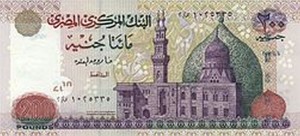Perversely, note economists, international pressure to increase the value of Palestinian lives has been directly exclusively at Israel.
 Cairo, November 6 – In keeping with the demands of the International Monetary Fund to stabilize and reform the country’s economy, the Egyptian government today devalued its currency and, while it was at it, also reduced the value it assigns to Palestinians inhabiting the Gaza Strip, where the Egyptian military maintains a blockade of the border.
Cairo, November 6 – In keeping with the demands of the International Monetary Fund to stabilize and reform the country’s economy, the Egyptian government today devalued its currency and, while it was at it, also reduced the value it assigns to Palestinians inhabiting the Gaza Strip, where the Egyptian military maintains a blockade of the border.
President Abdel Fatah Al-Sisi approved a measure by which the pound’s exchange rate will now be determined by its value relative to other currencies instead of controlled by the government. As a result the currency lost nearly half its value within a few hours of currency markets opening, and prices rose commensurate with the change. Palestinian lives, already cheap by Egyptian standards, decreased even further in value, accounting for only one hundredth of one percent of the rhetorical value they once commanded in Egypt.
With the currency flotation, as the switch is termed, operative, the IMF is expected to approve an agreed $12-billion loan to revive the Egyptian economy, following an accord reached in August. The loan will be used to help increase foreign investment and offset lost revenues from slumping tourism, and comes along with a new Value-Added Tax and rationing of certain goods. Egyptians have yet to protest the increasing economic hardship, but have seldom in recent memory protested the country’s treatment of Palestinians in the Gaza Strip, who receive hundreds of truckloads per day of food, clothing, medicines, and consumer goods from Israel, but barely a trickle from Egypt.
Perversely, note economists, international pressure to increase the value of Palestinian lives has been directly exclusively at Israel, which has taken measures to shore up that value even while conducting wars with Hamas, the militant Islamist organization that governs Gaza. “It’s more than a little odd,” observed Anne T. Smitts of the World Bank. “The international community has all but ignored the role of Egyptian policy in the value of Palestinian lives, even though Egypt actually controlled the Gaza Strip between 1948 and 1967. But everyone just ignores that connection.” She noted the absence of protests directed at the Cairo government to alter its continued devaluation of Palestinian lives and contrasted it with daily criticism of Israel for merely maintaining those lives’ value.
Smitts predicted that investors will continue to focus only on Egypt’s devaluation of its currency and continue to ignore the value it places on Palestinian lives. “Investors are wary of bait-and-switch schemes, and the value Arab governments place on Palestinian lives, even when higher than its historic average, ends up burning the investor in the end,” she explained. “In the end the scheme is always about the political leverage that can be gained from that artificially propped-up value, and never about the actual value of Palestinian lives, which has always hovered close to zero in the Arab world.”
Please support our work through Patreon.




